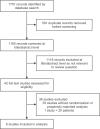Extracorporeal cardiopulmonary resuscitation for out-of-hospital cardiac arrest: A systematic review and meta-analysis of randomized and propensity score-matched studies
- PMID: 35199375
- PMCID: PMC9307006
- DOI: 10.1111/aor.14205
Extracorporeal cardiopulmonary resuscitation for out-of-hospital cardiac arrest: A systematic review and meta-analysis of randomized and propensity score-matched studies
Abstract
Background: In selected patients with refractory out-of-hospital cardiac arrest, extracorporeal cardiopulmonary resuscitation represents a promising approach when conventional cardiopulmonary resuscitation fails to achieve return of spontaneous circulation. This systematic review and meta-analysis aimed to compare extracorporeal cardiopulmonary resuscitation to conventional cardiopulmonary resuscitation.
Methods: We searched PubMed, EMBASE, and the Cochrane Central Register of Controlled Trials up to November 28, 2021, for randomized trials and observational studies reporting propensity score-matched data and comparing adults with out-of-hospital cardiac arrest treated with extracorporeal cardiopulmonary resuscitation with those treated with conventional cardiopulmonary resuscitation. The primary outcome was survival with favorable neurological outcome at the longest follow-up available. Secondary outcomes were survival at the longest follow-up available and survival at hospital discharge/30 days.
Results: We included six studies, two randomized and four propensity score-matched studies. Patients treated with extracorporeal cardiopulmonary resuscitation had higher rates of survival with favorable neurological outcome (81/584 [14%] vs. 46/593 [7.8%]; OR = 2.11; 95% CI, 1.41-3.15; p < 0.001, number needed to treat 16) and of survival (131/584 [22%] vs. 102/593 [17%]; OR = 1.40; 95% CI, 1.05-1.87; p = 0.02) at the longest follow-up available compared with conventional cardiopulmonary resuscitation. Survival at hospital discharge/30 days was similar between the two groups (142/584 [24%] vs. 122/593 [21%]; OR = 1.26; 95% CI, 0.95-1.66; p = 0.10).
Conclusions: Evidence from randomized trials and propensity score-matched studies suggests increased survival and favorable neurological outcome in patients with refractory out-of-hospital cardiac arrest treated with extracorporeal cardiopulmonary resuscitation. Large, multicentre randomized studies are still ongoing to confirm these findings.
Keywords: extracorporeal cardiopulmonary resuscitation; extracorporeal membrane oxygenation; neurological outcome; out-of-hospital cardiac arrest.
© 2022 The Authors. Artificial Organs published by International Center for Artificial Organ and Transplantation (ICAOT) and Wiley Periodicals LLC.
Conflict of interest statement
All authors have no conflict of interest to declare.
Figures
References
-
- Berdowski J, Berg RA, Tijssen JGP, Koster RW. Global incidences of out‐of‐hospital cardiac arrest and survival rates: systematic review of 67 prospective studies. Resuscitation. 2010. Nov;81(11):1479–87. - PubMed
-
- Sasson C, Rogers MAM, Dahl J, Kellermann AL. Predictors of survival from out‐of‐hospital cardiac arrest: a systematic review and meta‐analysis. Circ Cardiovasc Qual Outcomes. 2010. Jan;3(1):63–81. - PubMed
-
- Perkins GD, Callaway CW, Haywood K, Neumar RW, Lilja G, Rowland MJ, et al. Brain injury after cardiac arrest. Lancet. 2021. Aug 26. Available from:. https://www.sciencedirect.com/science/article/pii/S0140673621009533 - PubMed
-
- Chen YS, Lin JW, Yu HY, Ko WJ, Jerng JS, Chang WT, et al. Cardiopulmonaryresuscitation with assisted extracorporeal life‐support versus conventionalcardiopulmonary resuscitation in adults with in‐hospital cardiac arrest: anobservational study and propensity analysis. Lancet. 2008;372:554–61. - PubMed
Publication types
MeSH terms
LinkOut - more resources
Full Text Sources
Medical




